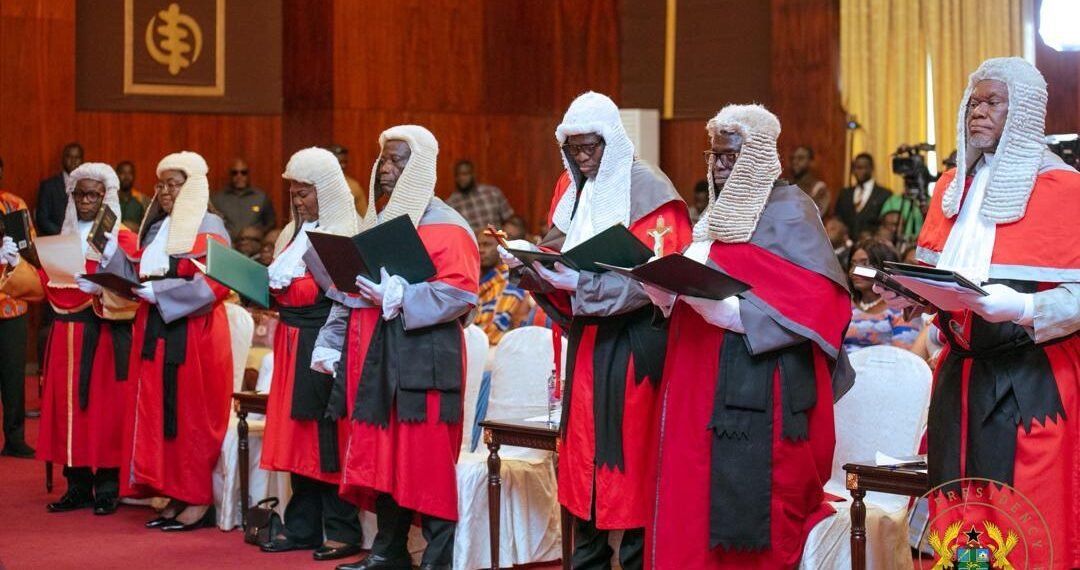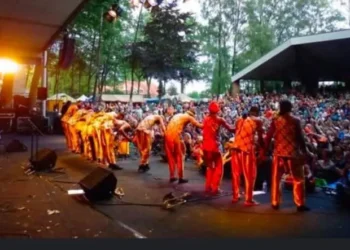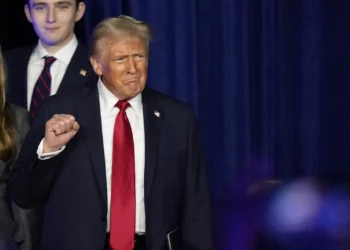HE President John Dramani Mahama has sworn into office seven newly appointed Justices of the Supreme Court of Ghana in a solemn ceremony at the Jubilee House, calling on the judiciary to rise to its noble calling in the country’s ongoing agenda for national renewal and institutional reform.
The newly appointed Justices— Senyo Dzamefe, Sir Dennis Dominic Adjei, Gbiel Simon Suurbaareh, Kweku Tawiah Ackaah-Boafo, Philip Bright Mensah, Janapare Bartels-Kodwo, and Hafisata Amaleboba—take their places on the nation’s highest bench at a moment President Mahama described as “a turning point in our democratic journey.”
Addressing the gathering, President Mahama emphasized that the appointments are not merely a procedural necessity but a profound reaffirmation of Ghana’s constitutional trust in the judiciary.
“On behalf of the government and the good people of Ghana, it’s my singular honor to congratulate you, our newly appointed justices, on your elevation to the highest court of the land. Yours is a rare and distinguished calling. It is a high constitutional trust.”
HE President John Dramani Mahama
Describing the Supreme Court as “the final custodian of our laws, the guardian of our democracy, and the protector of the rights and liberties of all our citizens,” President Mahama noted that Ghanaians look to the judiciary in moments of uncertainty, when freedoms are under threat, and when the constitution is tested by the complexities of modern governance.
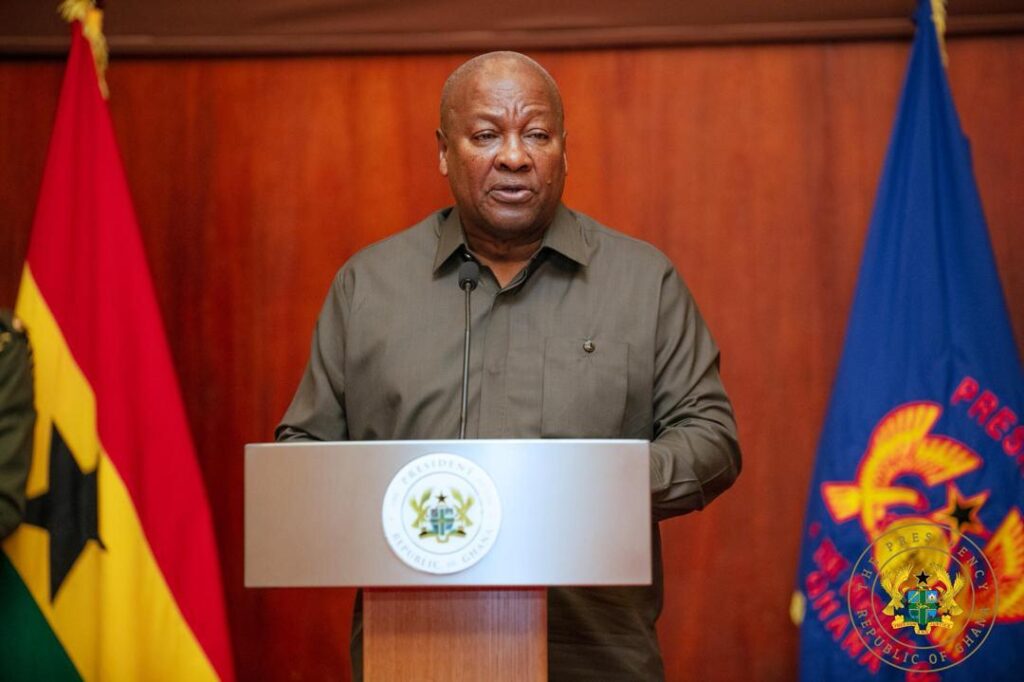
“As justices of this noble institution, you are called not merely to interpret the law but to embody its highest ideals which are fairness, impartiality, integrity, and courage.
You are expected to serve not as arbiters of technicalities but as stewards of justice and conscience. Yours is not only a legal role but a moral responsibility to safeguard our constitutional spirit and interpret it in ways that advance the common good and protect the most vulnerable in our society.”
HE President John Dramani Mahama
Judiciary at a Critical Juncture
President Mahama observed that the country stands at a critical juncture where public trust in institutions is under strain.
According to him, Ghanaians live in an era of profound national reflection and are looking not only to the Executive for leadership but also to the Judiciary for assurance that the laws of the country will work for everyone; that there would be fairness and equality before the law; and that justice is not denied by undue delay.
The President acknowledged growing concerns over the erosion of confidence in state institutions, including the judiciary, attributing this crisis of trust to perceptions of inefficiency and political interference.
But he also highlighted the current moment as a chance to “begin again,” rebuild the judiciary’s reputation, and restore the people’s faith in the rule of law.
“Ladies and gentlemen, this is the essence of the Ghana reset agenda. A national renewal grounded in justice, equity, transparency, and institutional reform. A reformed and revitalized Ghana must rest on the firm foundation of a credible, independent, and efficient justice system.”
HE President John Dramani Mahama
Key Reforms to Drive Justice
Underscoring his administration’s commitment to an inclusive and responsive judiciary, President Mahama outlined key reforms to be pursued under the Reset Agenda.
These include digitizing and modernizing court processes to reduce delays, improving infrastructure and working conditions in the judicial sector, expanding legal aid and public defender services, and strengthening judicial training and ethics.
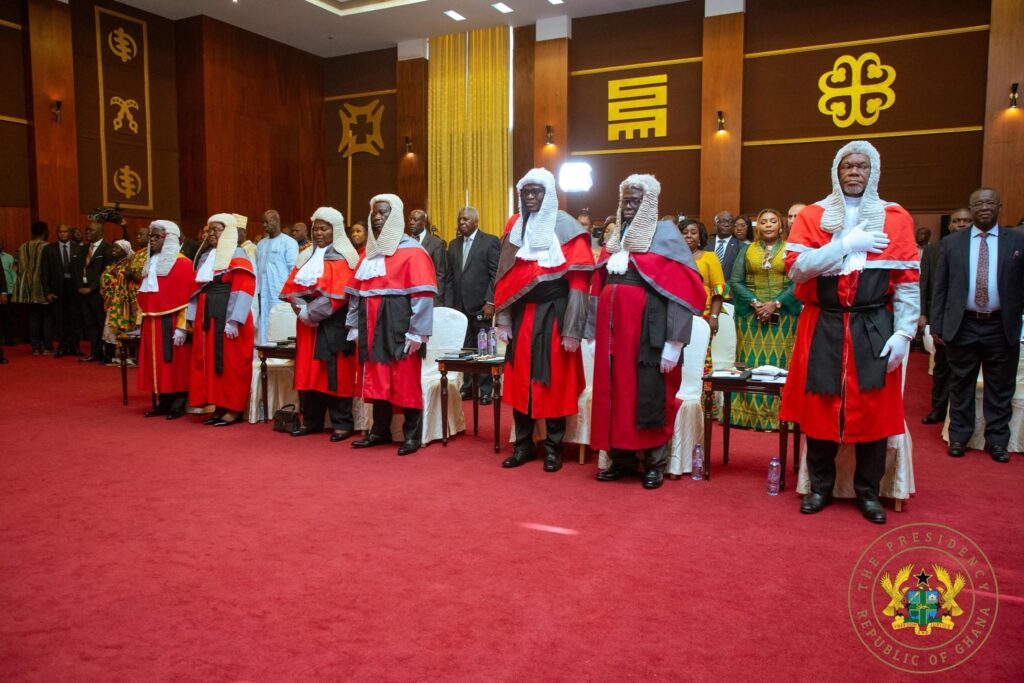
He also pledged deeper collaboration between the bench, the bar, and civil society to enhance the quality of justice delivery across the country.
“In our Ghana We Want vision, the judiciary is not a passive bystander in nation-building. It is an active guarantor of rights, an enabler of development, and a check on the excesses of power. The judiciary must not only speak the language of the law; it must understand the heartbeat of the nation.”
HE President John Dramani Mahama
To the newly sworn-in Justices, President Mahama issued a solemn charge, urging them to inherit the robe of honor and the weight of a nation’s expectations.
For him, the robe the justices wear is not simply a mark of office but a public trust and a symbol of service, humility, and accountability, charging them to wear it with wisdom.
He urged them to interpret the law not merely as it is written but as it ought to be—alive to context, sensitive to lived realities, and grounded in the values of equity and justice.
“Speak through your judgments, not your opinions. Show leadership through principle, not preference. Let your legacy be measured not only in volumes of law reports, but in the lives you touched, the precedents you set, and the public trust you preserved.”
HE President John Dramani Mahama
President Mahama also hinted at broader constitutional reforms, expressing confidence in the work of the Constitutional Review Committee chaired by Professor H. Kwesi Prempeh.
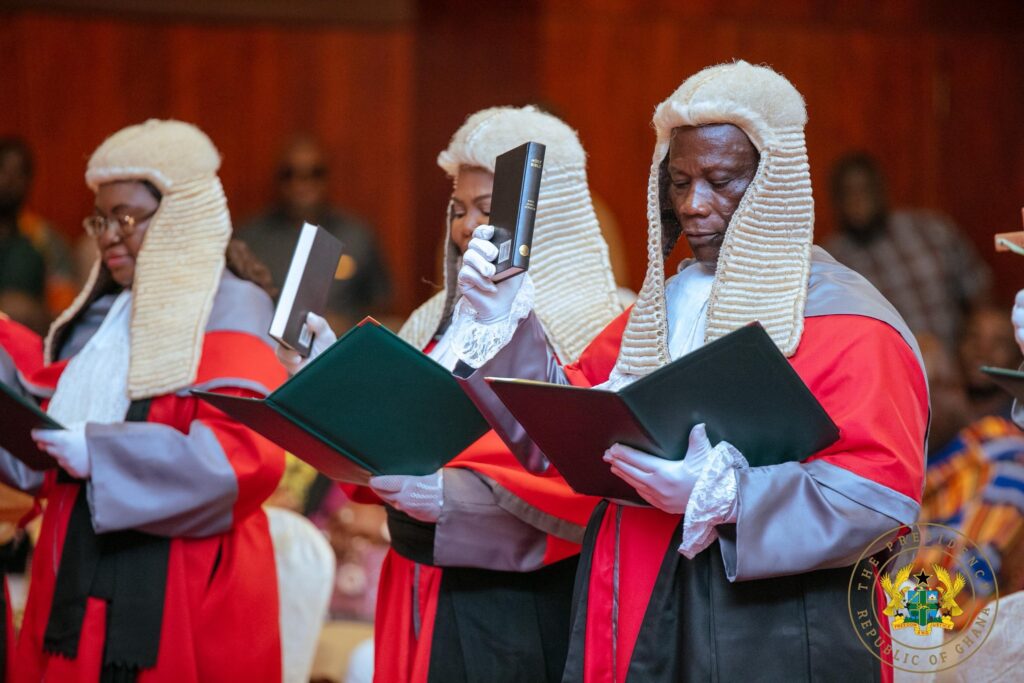
He expressed optimism that the Committee’s report expected in August will contain recommendations that will make the country’s judiciary more effective and just.
He emphasized that a strong, impartial judiciary is essential for stable governance, citizen security, economic growth, and investor confidence.
“History teaches us that where the judiciary is strong, society is stable. Where the judiciary is impartial, citizens feel secure. And where the judiciary is respected, democracy flourishes. We must protect our courts from political interference, economic manipulation, and public intimidation.”
HE President John Dramani Mahama
Judiciary as Beacon of Hope
In a stirring conclusion, the President declared the swearing-in not just a ceremonial function, but a “beacon of hope” in a time when many Ghanaians are yearning for direction and renewal.
For him, it is a signpost that the reset has begun—not only in words but also in action and the country’s institutions. We are building a new Ghana, one where our institutions work, leadership listens, merit is rewarded, and justice is blind not to truth, but blind to bias.”
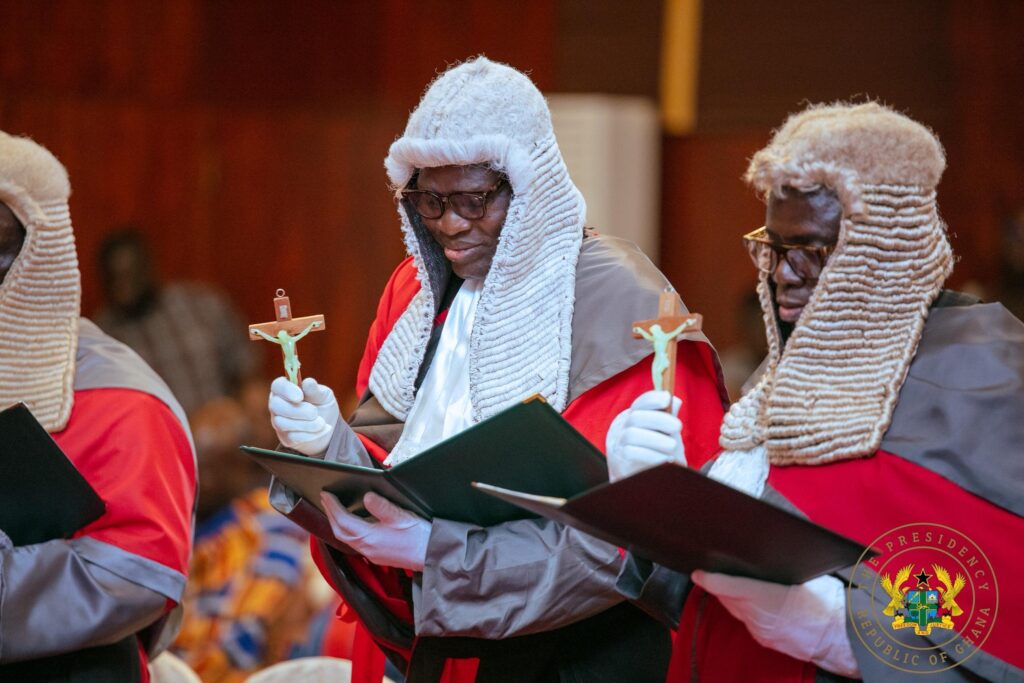
Calling for collective responsibility in nation-building, President Mahama appealed to all Ghanaians—from public officials to ordinary citizens—to contribute to the restoration of national values.
To the newly appointed Justices, President Mahama once more commended them, expressing Ghanaians’ confidence in their leadership at the bench.
“The nation stands with you, and history will be your judge on how fairly you have dispensed justice and on the firmness of your resolve. Let your conscience be your compass.
“Let the Constitution be your guide. And let the people of Ghana be a constant reminder to you of the power and purpose of the law. Let justice reign. May God bless you. May God bless our judiciary, and may God bless our homeland Ghana.
HE President John Dramani Mahama
READ ALSO: GNPC Expands Offshore Safety Outreach to Fishing Communities

